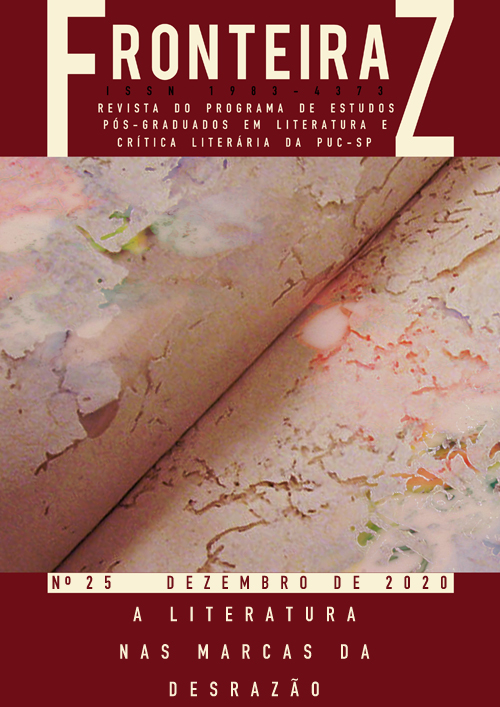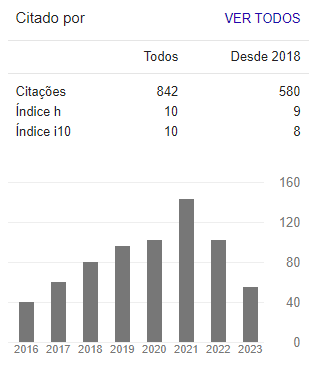Afasia e desrazão em A arte de produzir efeito sem causa, de Lourenço Mutarelli
DOI:
https://doi.org/10.23925/1983-4373.2020i25p92-108Palavras-chave:
Desrazão, Nonsense, Afasia, A arte de produzir efeito sem causa, Lourenço MutarelliResumo
O quarto romance de Lourenço Mutarelli, A arte de produzir efeito sem causa (2008), é um campo fértil para a reflexão acerca do fenômeno literário sob as marcas da desrazão e do nonsense, efeitos de um processo afásico que invade todos os planos do romance. O distúrbio cognitivo-linguístico da afasia, mais do que um mero dado do enredo, constitui-se como um dispositivo que contamina narrador, personagens, conexões intra e inter capítulos, bem como o projeto gráfico-visual estruturador do livro. A desativação das regras discursivas provocada pela afasia gera uma narrativa na qual o encadeamento está rompido, expondo um lugar fraturado no qual se verifica a ruína da arte de narrar. Ao pôr em crise o princípio lógico da causalidade, que determina que todo efeito deve ser consequência de alguma causa, o romance atinge uma dimensão estética, ética e política e pode ser considerado um experimento-limite do gênero na atualidade.
Referências
AGAMBEN, G. Homo Sacer. O poder soberano e a vida nua I. Trad. Enrique Burigo. Belo Horizonte: Editora UFMG, 2004.
AGAMBEN, G. Arte, inoperatividade, política. In: Crítica do contemporâneo. Conferências Internacionais Serralves. Trad. Simoneta Neto. Porto (Portugal): Fundação Serralves, 2007.
ANTUNES, C.; UMBACH, R.; MOREIRA, S. A metonímia do caos contemporâneo em A arte de produzir efeito sem causa. Litterata, Ilhéus, v. 5/1, p. 111-119, 2015. Disponível em: http://periodicos.uesc.br/index.php/litterata/article/view/1007. Acesso em: 11 set. 2020.
BENJAMIN, W. Magia e técnica, arte e política. Ensaios sobre literatura e história da cultura. Trad. Sérgio Paulo Rouanet. São Paulo: Brasiliense, 2012 (Obras Escolhidas, volume 1).
BURROUGHS, W. Revolução eletrônica. Trad. José Augusto Mourão. 3. ed. São Paulo: Passagens, 2010.
COUDRY, M. I. H. A linguagem em funcionamento na afasia. Letras de hoje, Porto Alegre, v. 36. n. 3, p. 449-455, 2001. Disponível em: https://revistaseletronicas.pucrs.br/ojs/index.php/fale/article/view/14600/9759. Acesso em: 11 set. 2020.
FOUCAULT, M. A vida dos homens infames. In: FOUCAULT, M. Estratégia, poder-saber. Ditos e escritos IV. Trad. Vera Lucia Avellar Ribeiro. Rio de Janeiro: Forense Universitária, 2003, p. 203-222.
GAGNEBIN, J. M. Não contar mais? In: GAGNEBIN, J. M. História e Narrativa em Walter Benjamin. São Paulo: Perspectiva/FAPESP, 1999, p. 55-72.
HORWITZ, B. An Open Letter to the Family of an Adult with Aphasia. In: Rehabilitation Literature, 1962. n. 23, p.141-4.
JAKOBSON, R. Dois aspectos da linguagem e dois tipos de afasia. In: JAKOBSON, R. Linguística e comunicação. Trad. Isidoro Blikstein e José Paulo Paes. 22. ed. São Paulo: Ed. Cultrix, 2010, p. 42-78.
MACHADO, I. O filme que Saussure não viu: o pensamento semiótico de Roman Jakobson. São Paulo: Editora Horizonte, 2007.
MUTARELLI, L. A arte de produzir efeito sem causa. São Paulo: Companhia das Letras, 2008.
MUTARELLI, L. O cheiro do ralo. São Paulo: Companhia das Letras, 2011.
SCHOLLHAMMER, K. Realismo afetivo: evocar realismo além da representação. Estudos de literatura brasileira contemporânea, Brasília, n. 39, p. 129-148, 2012. Disponível em: https://www.scielo.br/pdf/elbc/n39/08.pdf. Acesso em: 11 set. 2020.
TONEZZI, J. Distúrbios de linguagem e teatro: o afásico em cena. São Paulo: Plexus Editora, 2007.
Downloads
Publicado
Como Citar
Edição
Seção
Licença
Copyright (c) 2020 FronteiraZ. Revista do Programa de Estudos Pós-Graduados em Literatura e Crítica Literária

Este trabalho está licenciado sob uma licença Creative Commons Attribution-NonCommercial 4.0 International License.







 Este obra está licenciada com uma Licença
Este obra está licenciada com uma Licença 